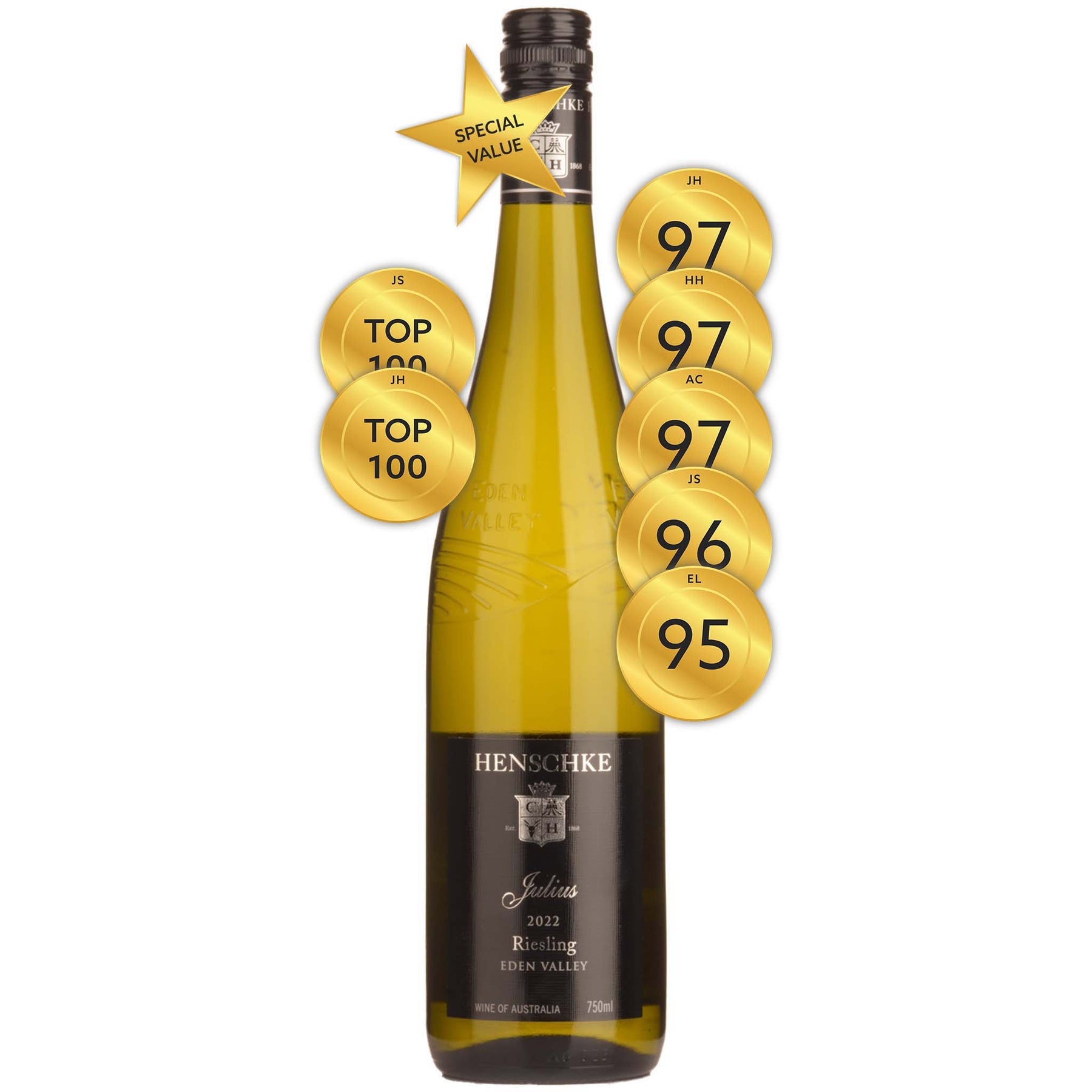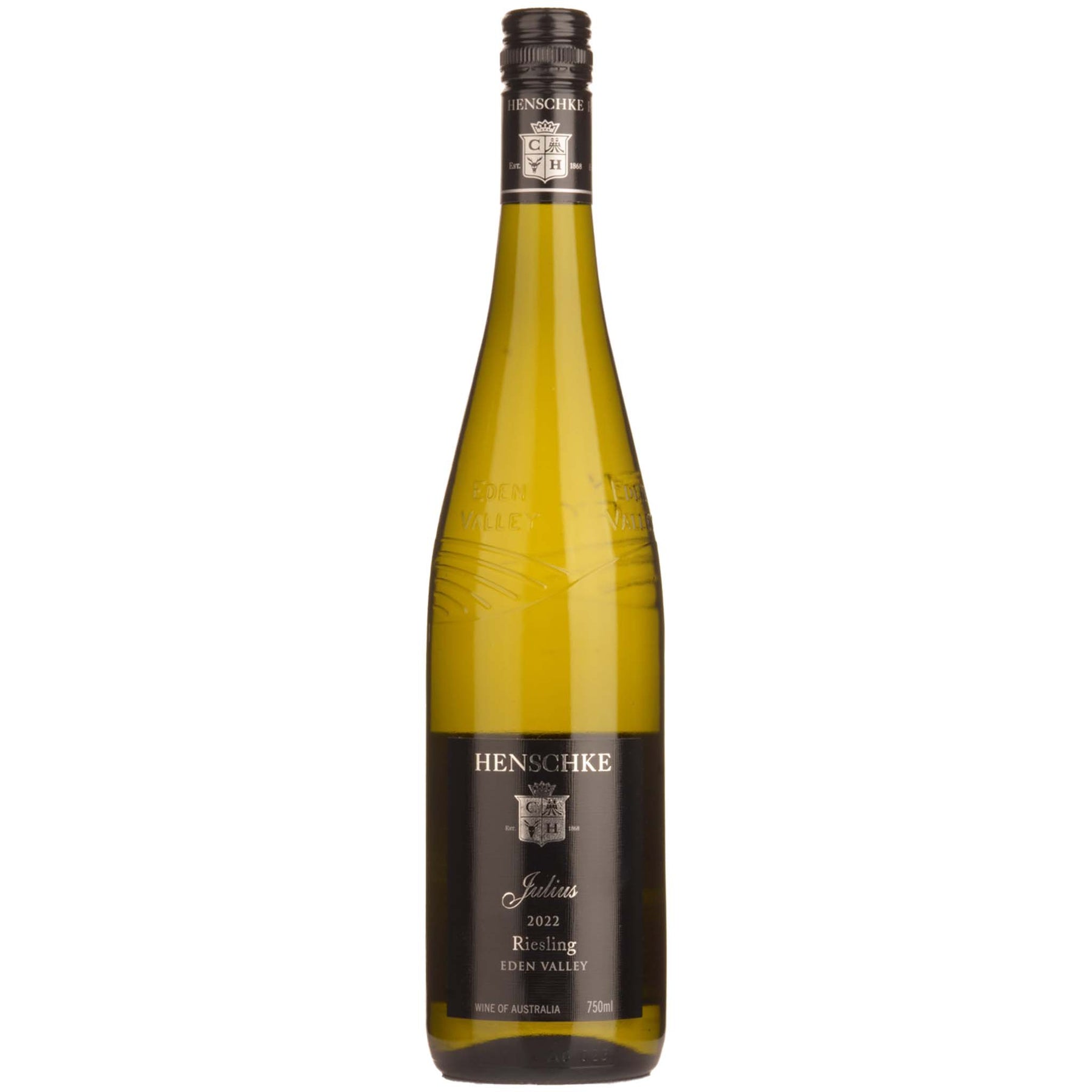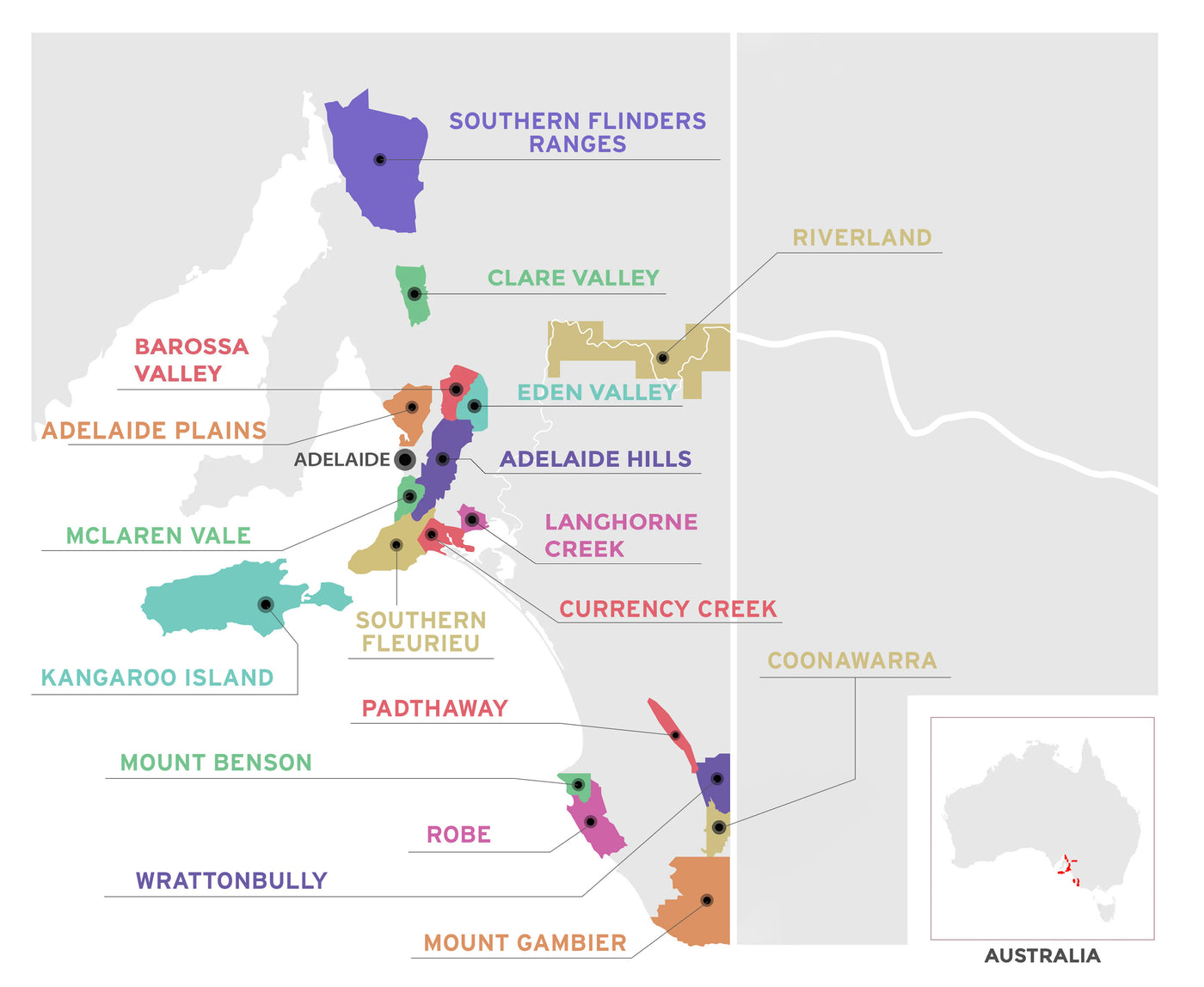

Henschke Julius Eden Valley Riesling 2022
Style: White Wine
Variety: Riesling
Closure: Screwcap
Henschke Julius Eden Valley Riesling 2022
Warehouse
34 Redland Drive
Vermont VIC 3133
Australia
Critic Score: 97
Alcohol: 12.5%
Size: 750 ml
Drink by: 2037
James Suckling Top 100 Wines of Australia 2022
James Halliday Top 100 Wines of 2022
The Julius Riesling is Henschke's flagship Riesling, named in honour of ancestor Julius Henschke, a famous craftsman and highly acclaimed artist and sculptor. The 2022 vintage marks the 30th release of the Julius Riesling. The fruit is sourced exclusively from their Eden Valley Vineyard, which is located at an altitude of 500m in the cooler part of the Mount Lofty Ranges. The vineyard was purchased by Cyril Henschke in 1966.
"2022 was blisteringly good, seemingly everywhere in South Australia, and that was never more true than for Riesling. Here, in the 2022 Julius Riesling, the tension and savory precision that marks Julius is out in full force; the wine this year is littered with preserved lemon, brine, pith and crushed shells and, more interesting, leafy things too, like green tea and orchard leaves. Excellent." Erin Larkin
"Pale straw with green hucs. Fragrant aromas of citrus blossom, white rosc petals, lime zest and Kaffir lime leaf, with hints of lemongrass and green peppercorn. A pure and mineral palate with concentrated ripe lime and slate-like acidity with laser focus, balanced by a fine, long, textural finish. Fermented in tank and bottled post-vintage to preserve the delicate aromatic fruit. Exceptional vintage, 25+ years (from vintage)." Henschke (Jul 2022)
Expert reviews
"This is a reserve selection from a number of Eden Valley vineyards honouring ancestor Julius Henschke, and is always a wine of utmost quality. Its flowery, fragrant lime and lemon aromas soar from the glass, the palate with its spear of unsweetened lime and lemon finish and aftertaste underlining its intensity and quality. Drink by: 2037." James Halliday, Halliday Wine Companion - 97 points and Top 100 Wines of 2022 and Special Value Wine ★
"Intense lime, bitter lemon, verbena aromas with tonic water notes. Beautifully balanced and classically structured with ample lime, lemon curd flavours, some tonic water/ flinty notes, fine chalky textures, very good mid-palate volume and fresh long crunchy acidity. Finishes al-dente with attractive mineral length. Lovely linear structure and concentration. Should develop very well." Andrew Caillard MW - 97 points
"Very light colour with a delightful bouquet of fresh and dried flowers, intense and already showing above-average complexity of bouquet and flavour. It's intense and rich in the mouth at the same time refined and subtle, delicate and stylish, a tracery of sweetness underlining the gorgeous fruit flavours and countering any suggestion of austerity. Long, long carry. An absolutely superb young riesling with a big future ahead of it. Drink: 2022–2034." Huon Hooke, The Real Review - 97 points
"This has such vibrant and pure, tangy fruit. Lime zest, lemons, white flowers, green apples, slate and shells. Dusty crushed stones, too. Sharp and precise, with a medium body and mouthwatering acidity. This is very fruity and dense, with a column of fruit that goes deep into the wine. From biodynamically grown grapes. Drink or hold." James Suckling, JamesSuckling.com - 96 points and Top 100 Wines of Australia 2022
"2022 marks the 30th anniversary of the Julius Riesling, and what a vintage to be able to commemorate. 2022 was blisteringly good, seemingly everywhere in South Australia (and Western Australia too), and that was never more true than for Riesling. Here, in the 2022 Julius Riesling, the tension and savory precision that marks Julius is out in full force; the wine this year is littered with preserved lemon, brine, pith and crushed shells (odd, sure, given the non-proximity to ocean!) and, more interesting, leafy things too, like green tea and orchard leaves. Kaffir lime, also? Excellent. Drink 2022-2037." Erin Larkin, Wine Advocate - 95 points
Awards
Top 100 Wines of Australia 2022 - James Suckling
James Halliday Top 100 Wines of 2022
Special Value Wine – Halliday Wine Companion ★
Eden Valley Vineyard
 The beautiful Henschke Eden Valley Vineyard is located at an altitude of 500m in the cooler part of the Mount Lofty Ranges, in a fertile area called Flaxmans Valley. Cyril Henschke purchased the Eden Valley property in 1966 and established a large planting of riesling (at a time when riesling was scarce) and shiraz, together with some cabernet sauvignon and other varietals.
The beautiful Henschke Eden Valley Vineyard is located at an altitude of 500m in the cooler part of the Mount Lofty Ranges, in a fertile area called Flaxmans Valley. Cyril Henschke purchased the Eden Valley property in 1966 and established a large planting of riesling (at a time when riesling was scarce) and shiraz, together with some cabernet sauvignon and other varietals.
Today the riesling is the source of the Julius Eden Valley Riesling, named in honour of Stephen's great-uncle Julius Henschke, a highly acclaimed artist and sculptor, while the cabernet sauvignon is used in the Cyril Henschke Cabernet Sauvignon. The shiraz is used in the Wheelwright Shiraz, named after Johann Christian Henschke who founded the Henschke winery, and in the Keyneton Euphonium blend, named after the early English pioneer Joseph Keynes who settled at Keyneton in 1842 and after whom the village was named.
The semillon provides fruit for the Louis Eden Valley Semillon, named in tribute to vigneron Louis Henschke who tended the Hill of Grace vineyard for 40 years. The Joseph Hill Gewürztraminer is named after Joseph Hill Thyer and the Eleanor's Cottage Sauvignon Blanc is blended with Semillon and is named after Eleanor Thyer, who built the settlers cottage on the tributary of the North Para River, adjacent to the sauvignon blanc vineyard.
The vines are planted on their own roots on a contour planting to conserve soil moisture and reduce erosion. They are effectively dry grown, although the soil moisture is monitored and in drier years drip irrigation is used to keep the vines physiologically active. The vineyard is on a range of well-drained duplex soils from sandy loam over gravel and bedrock with patches of clay to sandy loam over clay.
Vines are planted on a spacing of 3.4m between rows and 2m between vines and yield an average of 5 t/ha. There are a number of trellis types ranging from single wire to VSP (Vertical Shoot Positioned) and Scott Henry. There is ongoing research on canopy management and trellis style. A clonal research trial for semillon, including old and new clones, is being run and eutypa control trials on shiraz will help discover ways of improving the longevity of old vines.
Originally the ground was cultivated for weed control. Nowadays the vineyard has a permanent sod culture of early-maturing perennial rye and cocksfoot grasses in the row. A wheat straw mulch is used under the vines to retain soil moisture, build up organic matter, and inhibit weed growth. Prediction of disease pressure through an integrated pest management program results in minimal chemical input in the vineyard. Organic and biodynamic practices have been introduced.
Stephen & Prue
Winemaker Stephen Henschke, fifth-generation family member and youngest son of Cyril Henschke, showed great interest in science and winemaking at an early age. With a wonderful family heritage of more than 140 years of grape growing and winemaking spanning five generations, this came as no surprise. He is proud that the Henschke name and reputation is inexorably linked with red wines in general and Hill of Grace in particular, but with winemaking in his lifeblood, he approaches all wine styles with the same depth of passion and commitment to quality.
Stephen has retained the traditional approach to red winemaking used by his forebears. They handled the wines gently, used minimal racking, low sulphur, and gentle fining and filtration. They took a puristic, holistic approach that had been passed down from generation to generation so his winemaking techniques are almost intuitive. He keeps intervention to a minimum, favouring gentle extraction of his reds so as to retain freshness and subtlety, and applies Old World techniques to his New World white grapes for elegance and texture. At the ‘50 Years of Hill of Grace' celebration in 2008 when Stephen tasted every vintage – some for the first time – he was struck by how closely he was emulating his father's winemaking of the late 1950s and the 60s with his minimal intervention techniques.
Stephen is also mindful of his European roots and is a proud supporter of the historical language, food, religion and wine culture of his Silesian forebears still alive in pockets in the Barossa.
Stephen's support and contribution to the Barossa was acknowledged in 1984 when he was inducted into the Barons of Barossa wine fraternity, of which his father Cyril was a founding member.

Viticulturist, botanist and environmentalist Prue Henschke manages their 105 hectares of vineyards in the Eden Valley and Adelaide Hills. With today's advanced viticultural practices the greatest focus at Henschke is given to the quality of fruit in the vineyard. The increase in quality of both the red and white wines, which has helped take this iconic wine brand to the next level, is largely attributed to the increase in fruit quality.
Although Prue didn't set out to work in the wine business, she has become a key figure in the evolution of Australian viticulture and wine. She has a commitment to restoring balance to the natural environment, minimising harmful impacts and to regenerating the Henschke vineyard ecosystems. This has seen her win numerous local and international awards.
Prue became part of the Henschke world when she married Stephen, a fifth-generation Henschke. And for over 30 years, she has been a true pioneer. Her influence in the vineyards has been a balancing act of respecting tradition and protecting history while making bold decisions to innovate and improve. She restructured the vineyards, introduced new trellis types and transformed soil management using composts and mulches, which has led to adoption of organic and biodynamic practices.
How has Prue managed to blaze new trails among precious, historic vineyards. It all comes down to science. Science is the link between the vines and the quality of the wines that come from it. And it's how Prue's world collided with the Henschke dynasty. Her early interest in science led her to study botany and zoology at Adelaide University in the early 1970s. There she met Stephen, a fellow science student. After graduating, the pair headed to Germany for two years, where Prue became involved in viticulture and plant physiology. She worked at the Geisenheim Institute Vineyards and volunteered on a project in the Botanic Institute at Geisenheim – an experience that sparked a lifelong passion and set her on the path to becoming a leading viticulturist.
After returning to Australia and studying Wine Science alongside Stephen, Prue gained more experience in viticultural research, before becoming a viticultural consultant. In 1980 she started working with Stephen, who had taken over as winemaker at Henschke. They bought an apple orchard in the Adelaide Hills, near where the very first Henschke vineyard had been planted in 1862, and converted it to a vineyard, creating a ‘living research station' where they experimented and tested theories on cool-climate viticulture. This revolutionary research became vital in growing and improving cool-climate wine production in Australia.
In 1987, Prue took on her current role at Henschke. She not only manages over 100 hectares of vineyards but is custodian of precious old vines, some of which have been in the earth since the first days of the family estate.
Prue represents the pinnacle of viticulture in Australia. Her influence has reached cool-climate vineyards across the country, and in 2016 she was named Viticulturist of the Year at the Australian Women in Wine Awards. She is a highly respected voice in the Australian wine community and a strong campaigner for environmental issues. Prue is passionate about protecting the natural environment while growing grapes good enough to create Australia's best wine. And Henschke wines have never been better.
Reference material taken from: https://www.australianwine.com/en-AU/our-makers/prue-henschke
The winery

Henschke is the best medium-sized red wine producer in Australia and is recognised as one of the world's great wine labels. It is home to Australia's most famous vineyard, the majestic Hill of Grace, which produces Australia's greatest single vineyard wine. Outstanding Shiraz, cabernet sauvignon and Rieslings are produced by the fifth and sixth generations of winemakers, with a focus on single-site expressions that tell the story of the land and the people that made them.
The Henschke family has been making wine since Johann Christian Henschke planted a small vineyard on his farming property at Keyneton in 1862. He was one of many Silesians who had fled their homeland in search of religious freedom. Johann Christian built a small two-storey cellar into the side of the hill and the first vintages of riesling and shiraz were released in 1868.
Each generation has built upon the foundations of Henschke. In more recent times, fourth-generation Cyril Henschke pioneered varietal and single-vineyard wines at a time when blended wines and fortifieds were in vogue. His greatest legacy was the creation of Hill of Grace and Mount Edelstone in the 1950s, single-vineyard shiraz wines from Eden Valley that have captured the red wine world's imagination.
Today, it is fifth-generation winemaker Stephen Henschke and his viticulturist wife Prue at the helm, passionately upholding the family name and reputation. This highly regarded team has won a multitude of awards that recognise the complementary nature of their roles and Henschke has gone from strength to strength over the past three decades under their guidance.
"Prue and I are the current 'keepers of the flame'. Just as earlier generations have done, we want to manage the vineyards and winery so they can be passed on to the next generation in better condition than we inherited them. The last 50 years have been an incredible journey for the Australian wine industry. Hill of Grace and Mount Edelstone are arguably the two oldest single vineyard wines produced in this country that tell the wine story of Australia. Our vision would not be complete without the expectation that future generations will uphold and perpetuate our belief that such ancient and unique single-vineyard sites can produce exceptional wines that are prized for their beauty and rarity."
In recent years Stephen and Prue have welcomed next-generation family members into the business. Their son, Johann, has carried on the family winemaking tradition in his capacity as winemaker and viticulturist since 2013, as the fifth and sixth-generations transition through the period of the transfer of knowledge, skills, and traditions.
With many of the challenges for the next generation already well-documented, Johann expects that innovation and careful strategic planning will be crucial tools for him and his peers to utilise. Above all, continuing on the traditional winemaking techniques which the Henschke family have used for generations, and ensuring that Henschke continues to be nurtured in the same prudent way that it has always been, will allow it to be passed on to successive generations and to be held in the same high regard as it is today.

Henschke Vineyard Map

South Australia
South Australian is responsible for more than half the production of all Australian wine. It is home to more than 900 wineries across 18 wine regions. The regions are Adelaide Hills, Adelaide Plains, Barossa Valley, Clare Valley, Coonawarra, Currency Creek, Eden Valley, Kangaroo Island, Langhorne Creek, McLaren Vale, Mount Benson, Mount Gambier, Padthaway, Riverland, Robe, Southern Fleurieu, Southern Flinders Ranges and Wrattonbully.
Many of the well-known names in the South Australian wine industry established their first vineyards in the late 1830s and early 1840s. The first vines in McLaren Vale were planted at Reynella in 1839 and Penfold's established Magill Estate on the outskirts of Adelaide in 1844.
South Australia has a vast diversity in geography and climate which allows the State to be able to produce a range of grape varieties - from cool climate Riesling in the Clare and Eden Vallies to the big, full bodied Shiraz wines of the Barossa Valley and McLaren Vale. Two of Australia's best-known wines, Penfolds Grange and Henschke Hill of Grace, are produced here. There is much to discover in South Australia for the wine lover.

